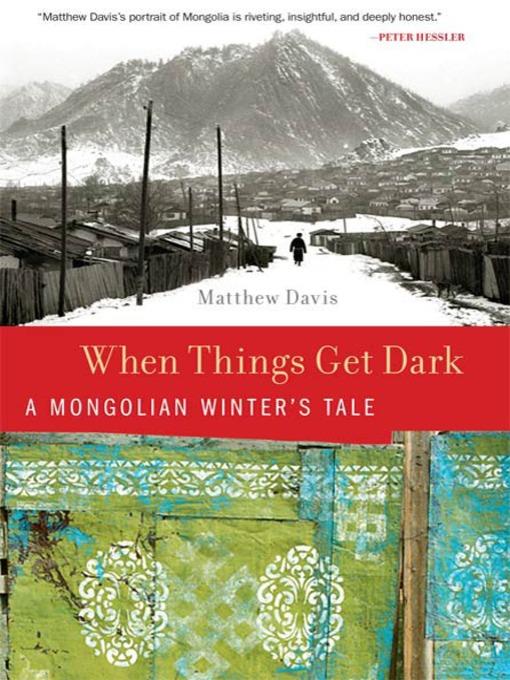
When Things Get Dark
A Mongolian Winter's Tale
کتاب های مرتبط
- اطلاعات
- نقد و بررسی
- دیدگاه کاربران
نقد و بررسی

November 30, 2009
Davis, a graduate student at Johns Hopkins School of Advanced International Studies, recounts his two eventful years as a Peace Corps volunteer teaching in a small Mongolian town in his knowledgeable yet convoluted memoir. As a 23-year-old Midwesterner, nothing prepared him for the former Communist satellite, which is largely rural and teeming with the legacy of the Great Khan, yaks and goats being herded on the rugged steppes. Davis sees a landscape on the brink of change and a young population eager for a better life depicted in Internet cafes and media from the outside world. Yet the isolation and culture shock plunge him into “a dangerous place psychologically,” and alcohol abuse and mayhem result in a brutal drunken fight. Other than some standard travelogue facts on Mongolian history and culture, Davis is correct when he concludes that his brief Mongolian journey was like “a flutter of an eyelid” and subsequently will feel the same way to the reader.

November 15, 2009
A lively, frank look into the Mongolian psyche by a young Peace Corps English teacher.
Based in the central mountainous city of Tsetserleg from 2000 to 2002, Davis was just 23 years old and fairly inexperienced in many things when he arrived in Mongolia. However, he was easygoing and not terribly fussy about heat and personal hygiene, preferring to live in a ger, the distinctive felt-covered tent spawned from the Mongolians' nomadic way of life. His entertaining travelogue/memoir is divided into nine sections,"Nine Nines," by which Mongolians demarcate the long, dark winter season. Perhaps as a result of their 70-year socialist period—ending with the fall of Soviet Communism in 1991—the mostly young-adult native students were keen to obey the teacher's authority, though quick to cheat when they could get away with it, often lazy and rarely given to creative expression. After the Soviets had largely obscured Mongolian history deriving from Chinggis Khan—as the name of the founder of the Mongolian Empire is written here—the great warrior has been rediscovered with a vengeance, and Davis provides a serviceable history of Mongolian politics (the country is only now emerging as a democracy). Mostly, there are stories from the lives of the people he encountered: marriages and families complicated by a deeply ingrained drinking culture, promiscuity, domestic violence, low wages and yearning for Western goods and education. While traveling the country, Davis explored the Mongolian hatred for the Chinese, the attempts at regeneration of the Mongolian Buddhist heritage and preservation of the traditional herding ways.
A nicely organized work that offers a rare glimpse into a little-understood part of the world.
(COPYRIGHT (2009) KIRKUS REVIEWS/NIELSEN BUSINESS MEDIA, INC. ALL RIGHTS RESERVED.)

January 21, 2010
In his early twenties, Davis spent two years in a small Mongolian town teaching English to its inhabitants. But his ominous suggestion at the beginning that his drinking will undo him never quite comes to fruition. More interesting are his everyday interactions with Mongolians, particularly his co-teachers at the local college. They are the fabric of Mongolian society-the main and sometimes sole breadwinners, they also take care of the kids and the housework while their often feckless husbands drink and fight. Depressing, yes, but the women's pluck never flags, and Davis never lets them be martyrs.-Tania Barnes, Brooklyn, NY
Copyright 2010 Library Journal, LLC Used with permission.

February 1, 2010
In 2000, at the age of 23, Davis leaves Chicago, his hometown, to travel to Mongolia to work as a teacher for the Peace Corps. Once he arrives in the small town of Tsetserleg, Davis moves into a ger, the circular tent that will be his home for the next two years, and gets to know the family whose land he is living on. He finds his students difficult to motivate, and a romance with a beautiful Mongolian teacher is heated but brief. After enduring a brutal Mongolian winter and a plague-induced quarantine, Davis finds himself falling into the trap he sees so many Mongolian men around him succumbing to: drinking constantly and giving into violent tendencies. The longer hes in Mongolia, the deeper he falls into depression and ennui, until a violent encounter shakes him into realizing his life has to change. Both a raw personal examination and an insightful look at Mongolian history and culture, Davis illuminating memoir sheds light on a remote region.(Reprinted with permission of Booklist, copyright 2010, American Library Association.)

























دیدگاه کاربران